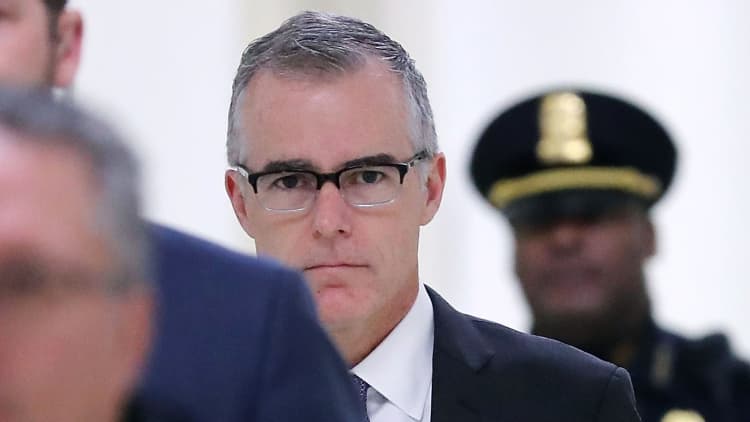Former FBI Deputy Director Andrew McCabe said Tuesday that no congressional leaders voiced objections when he told them in May 2017 that the bureau had opened a counterintelligence investigation into President Donald Trump.
McCabe's comments came as he goes on a publicity blitz to promote his memoir, "The Threat: How the FBI Protects America in the Age of Terror and Trump," which was published Tuesday. Trump has increased his attacks on McCabe, suggesting the former FBI official was in on a "treasonous" plot against him.
McCabe writes in his book that the briefing for the "Gang of Eight" leaders in Congress came days after Trump fired FBI Director James Comey, making McCabe acting director of the bureau at the time. Deputy Attorney General Rod Rosenstein told the bipartisan group of lawmakers in that meeting that special counsel Robert Mueller had been appointed to continue the Russia investigations, according to McCabe.
In an interview on NBC's "TODAY" on Tuesday morning, McCabe elaborated by saying he had informed the leaders that the FBI had opened a counterintelligence probe into Trump himself.
"The purpose of the briefing was to let our congressional leadership know exactly what we'd been doing," McCabe said when asked specifically if he told Congress about the investigation into the president.
"Opening a case of this nature, not something that an FBI director, not something that an acting FBI director would do by yourself, right? This was a recommendation that came to me from my team, I reviewed it with our lawyers, I discussed it at length with the deputy attorney general," McCabe said, "and I told Congress what we had done."

Pressed by NBC's Savannah Guthrie on whether any member of the group objected, McCabe said that none of them had.
"That's the important part here, Savannah. No one objected. Not on legal grounds, not on constitutional grounds, and not based on the facts," McCabe said.
On the Senate side, the group of lawmakers at the time were Majority Leader Mitch McConnell, R-Ky., Minority Leader Chuck Schumer, D-N.Y., Intelligence Committee Chairman Richard Burr, R-N.C., and ranking member Mark Warner, D-Va.
The House members were then-Speaker Paul Ryan, R-Wis., and then-Minority Leader Nancy Pelosi, D-Calif., as well as former House Intelligence Chairman Devin Nunes, R-Calif., and then-ranking member Adam Schiff, D-Calif.
None of the spokespeople for the group confirmed McCabe's May 2017 comments when asked by CNBC.
"We never commented on Speaker Ryan's intelligence briefings, and that remains the rule," Ryan spokesman Kevin Seifert said.
A spokeswoman for Warner declined to comment on McCabe's claims.
Trump, his legal team and the White House have consistently denied any wrongdoing involving Russia. The White House did not immediately respond to a request for comment on McCabe's interview.
Less than a week earlier, McCabe said in another interview that he had launched the probes into Trump's potential Russia ties shortly after speaking to him in May 2017 following Comey's ouster.
McCabe said he was fearful he would be fired before those probes were on "solid ground." He wrote in his book that after the meeting "it felt like crossing a finish line," according to an excerpt in The Atlantic.
"If I got nothing else done as acting director, I had done the one thing I needed to do," McCabe wrote.
Sen. Angus King, I-Maine, a member of the Intelligence Committee, said on CNN on Tuesday that McCabe's characterization of the meeting "indicates that [the FBI wasn't] trying to do something sub rosa or behind anybody's back, or [that] it was some kind of secret coup."
Then-Attorney General Jeff Sessions fired McCabe last March, two days before he was scheduled to retire and become eligible for full pension benefits. Sessions, citing internal investigations, alleged that McCabe had engaged in misconduct by making "an unauthorized disclosure to the news media and lacked candor — including under oath — on multiple occasions." McCabe said the firing was "part of this Administration's ongoing war on the FBI and the efforts of the Special Counsel investigation."


